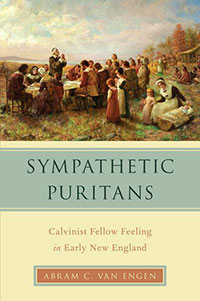Today, when we think of Pilgrims and Puritans, two images come to mind. The feast of Thanksgiving embodies a national mythology of friendship and fellow feeling. Yet outside the holidays, we tend to see both groups as stern, stoic and unsympathetic — and to collapse distinctions between them.
So, who were the Pilgrims? Who were the Puritans? And how did they view Native Americans?

“Most broadly, ‘Puritanism’ includes all those who felt the Church of England needed to be reformed,” said Abram Van Engen, PhD, assistant professor of English in Arts & Sciences at Washington University in St. Louis and author of “Sympathetic Puritans: Calvinist Fellow Feeling in Early New England” (Oxford University Press, 2015). “Those who abandoned the church we call Pilgrims.
“The Pilgrims had it worse, since leaving the Church of England was an act of treason,” Van Engen said. “Fleeing to America in 1620, they were a small group, mostly poor, and they landed in a place where they had no legal right to be. The Puritans, meanwhile, arrived in 1630 with a large entourage, a decent amount of wealth, a stated intention of remaining in the Church of England, and a handy charter establishing their right to rule the newly made colony of Massachusetts Bay.
“All of them could be stern and stoic, it is true, but that was not the point or goal of their faith. In fact, they preached that ‘the godly’ should sympathize with one another. Convivial fellow feeling was a sign of salvation and a mark of membership in the church. If a church flourished, those who were actually godly would rejoice; if a true church failed, the truly godly would weep. The Puritans gleaned sympathy from scripture and preached it from the pulpit.

“Not that such sympathy necessarily extended to Native Americans, or anyone else outside the church. Precisely because sympathy mattered so much to the Puritans, it also needed to be monitored and controlled. Since sympathizing with someone meant joining that person in community, it mattered with whom one sympathized. Godly should sympathize with the godly in their distress and rejoice in the downfall of the wicked. Unfortunately, Puritans often defined Native Americans as the wicked and ungodly.
“In order to train the heart and to build communities of fellow feeling, the Puritans instituted days of fasting and thanksgiving. When grief was required, all would fast; when thanksgiving seemed appropriate, all were called to rejoice. For the Puritans, Fast Days and Thanksgiving Days were communal experiences of fellow feeling meant to unite the affections and build up the godly community just as they understood Romans 12:15 to require:
“ ‘Rejoice with those who rejoice; and mourn with those who mourn.’ ”